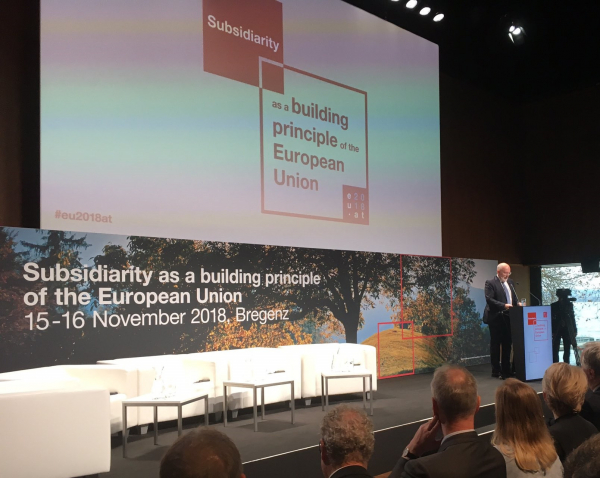Regional leader's team up with the Austrian Presidency of the Council of the EU

The Austrian Presidency of the Council of the European Union, chairing the Council meetings that bring together the representatives of national governments, organised a high-level conference on subsidiarity. The event brought together representatives of the EU institutions, national authorities and local and regional leaders. The ECR Group President was among those who participated in the debate.
The conference with the full title of "Subsidiarity as a building principle of the European Union" and took place in Bregenz in Austria on 15-16 November. It focused on scenario "doing less more efficiently" presented in the white paper on the future of Europe published by the European Commission 1 March 2017. The event was attended, among many other high level guests, by the country's Chancellor Sebastian Kurz. Among the key conclusions was the need for "active subsidiarity" understood as improved involvement of local and regional authorities in EU policy development. This could be achieved by better use of impact assessments and consultations.
In light of the ongoing efforts to improve the democratic accountability of the EU and better connect it with citizens, the conference focused on the role of local and regional authorities. In addition to being the level of government closest to citizens and the level that is most trusted by them, local and regional authorities are impacted by approximately 70 percent of EU legislation. However, their views on EU legislation are not always listened to.
Underlying the importance of the taking-decisions as close as possible to citizen, the ECR Group's President Rob Jonkman took the floor during the discussions raised a question to the Commission's First Vice-President Frans Timmermans about the links between subsidiarity and the Urban Agenda. The Urban Agenda was launched in 2016 by the Pact of Amsterdam and represents a new multi-level working method promoting cooperation between Member States, cities, the European Commission and other stakeholders. It does this in order to help stimulate growth, liveability and innovation in the cities of Europe and to identify and successfully tackle social challenges. The ECR Group was active in 2016 in underlining that rural areas and cities of all sizes and their functional areas needed to be taken into account in the Urban agenda.

